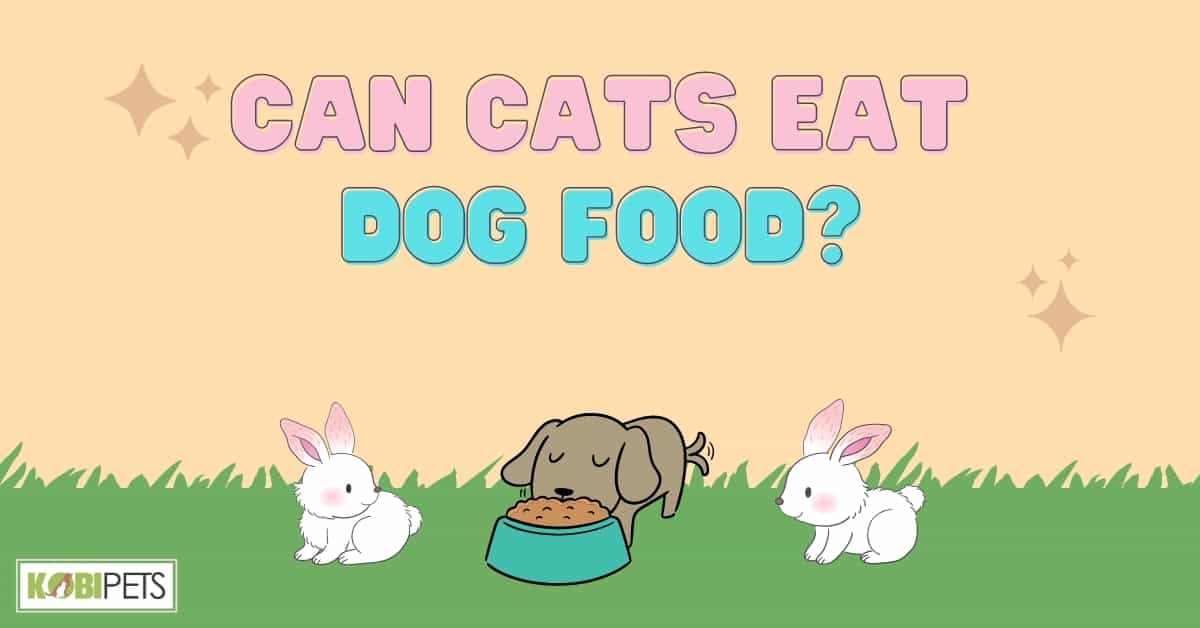
When it comes to the pet food aisle at your local store, it’s easy to get mixed up sorting through dog and cat food. Have you ever wondered if our beloved four-legged friends can enjoy a snack from either side of the aisle?
The answer to that is both interesting and complicated – cats can eat dog food, but they aren’t necessarily healthy eating it exclusively. While a small amount of dog food may not be harmful to your cat, it’s not recommended as a regular part of their diet.
Before making any big decisions on dietary options for feline family members, it pays to know more about why and when cats should stick to their own meals.
Nutritional Differences between Cats and Dogs
Cats and dogs have different nutritional requirements due to their unique physiology. While dogs can adapt to life on very little, cats have higher needs for many essential nutrients.
As a result, cat food tends to be higher in calories, protein, fat, and other essential nutrients compared to dog food.
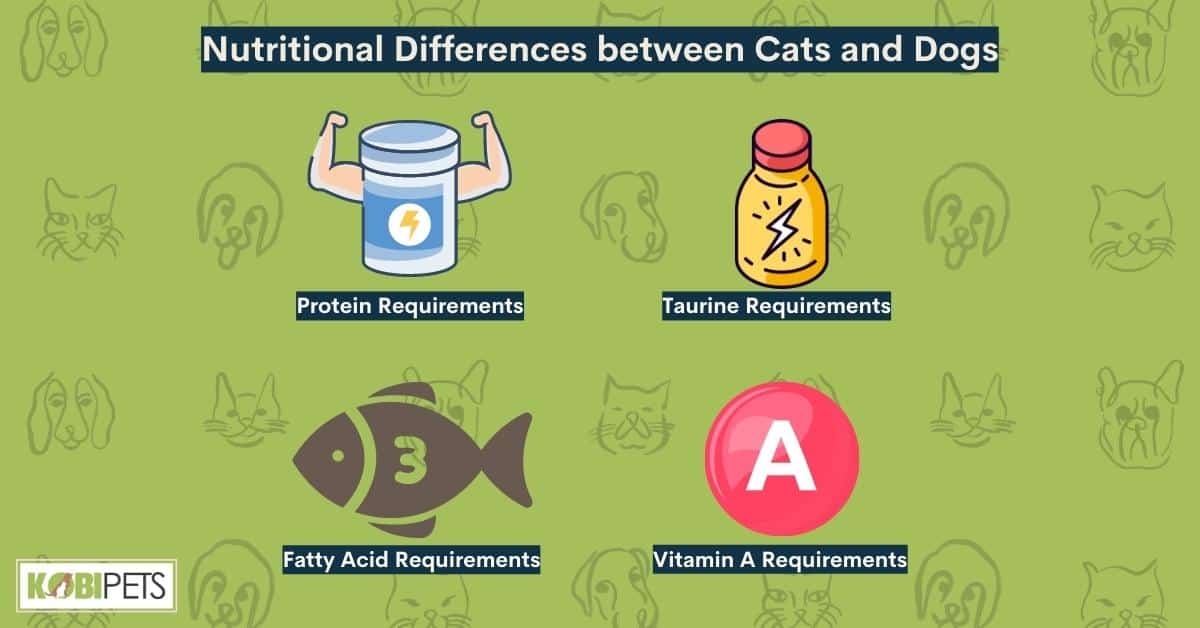
Nutritional Differences between Cats and Dogs
Protein Requirements
Cats are obligate carnivores, meaning they require a diet that is high in animal protein. They need more protein than other species like humans or dogs. Kittens need even more protein than adult cats as it is necessary for their growth and development.
Taurine Requirements
Taurine is an amino acid that is essential for cats but not for dogs. It plays a crucial role in maintaining healthy eyesight, heart function, digestion, and immune system in cats.
Vitamin A Requirements
Cats require more vitamin A than dogs as they cannot convert beta-carotene (a precursor of vitamin A) into the active form of vitamin A efficiently.
Fatty Acid Requirements
Cats require specific fatty acids such as arachidonic acid that are not required by dogs. These fatty acids play a vital role in maintaining healthy skin and coat.
Can Cats Eat Dog Food?
As a pet owner, it’s important to know what your furry friend can and cannot eat. One common question that arises is whether cats can eat dog food. The answer is yes, but with some caveats.
According to experts, cats can safely consume small amounts of dog food without any immediate harm.
However, it’s important to note that cats have unique dietary requirements that differ from dogs. Unlike dogs, cats are obligate carnivores, which means they require meat in their diet to thrive.
While a few bites of dog food may not cause any harm, feeding your cat dog food on a regular basis can lead to complications.
Long-term feeding of dog food to cats can result in nutritional deficiencies and health issues.
It’s also worth noting that dogs and cats have different nutritional needs. Dogs require more carbohydrates in their diet than cats do, while cats need more protein and fat.
Feeding your cat or dog food as a substitute for their regular diet can lead to imbalances in their nutrient intake.
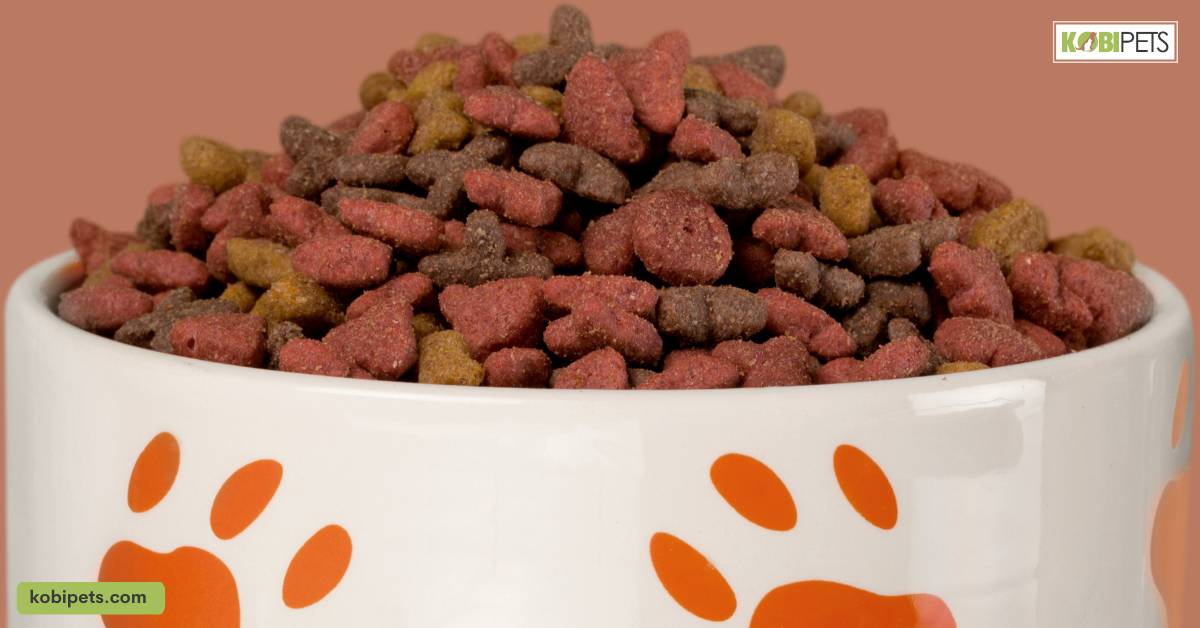
The Risks of Feeding Cats Dog Food
Feeding your cat and dog food may seem like a convenient solution if you have both pets in your household, but it can actually pose several risks to your cat’s health. Here are some of the most significant risks of feeding cats dog food:
- Nutritional deficiencies: Cats have different nutritional needs than dogs, and dog food is not formulated to meet the specific dietary requirements of cats. For example, cats require more protein and amino acids than dogs, and they also need taurine, an essential amino acid that is not found in dog food. If your cat eats dog food on a regular basis, it may suffer from nutritional deficiencies that can lead to health problems.
- Obesity: Dog food is often higher in calories and fat than cat food, which can cause your cat to gain weight and become obese. Obesity in cats can lead to a variety of health issues, including diabetes, heart disease, and joint problems.
- Digestive problems: Cats have more sensitive digestive systems than dogs, and they may not be able to tolerate some of the ingredients found in dog food. For example, dog food often contains grains like corn and wheat, which can be difficult for cats to digest and may cause digestive issues such as vomiting and diarrhea.
- Kidney disease: Some dog foods contain higher levels of phosphorus than cat food, which can be harmful to cats with kidney disease. If your cat has a pre-existing kidney condition, feeding them dog food could exacerbate their symptoms and lead to further health problems.
- Allergic reactions: Cats can be allergic to certain ingredients in dog food, such as beef, chicken, and grains. If your cat is allergic to one of these ingredients and eats dog food that contains it, it may experience an allergic reaction that can cause skin problems, gastrointestinal distress, and other health issues.
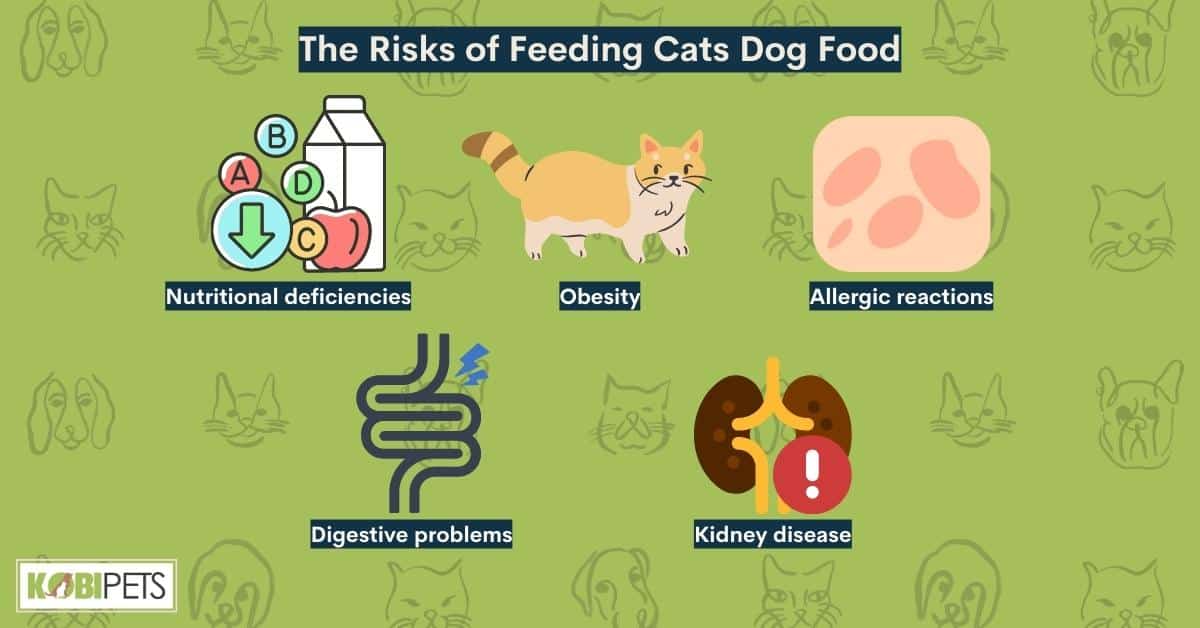
The Risks of Feeding Cats Dog Food
What Happens if Cats Eat Dog Food?
If you’re a pet owner with both cats and dogs, you may have caught your feline friend sneaking a bite or two from the dog’s food bowl. While it may seem harmless, it’s important to understand what happens if cats eat dog food.
Firstly, it’s important to note that dog food isn’t toxic to cats. So, if your cat eats a small amount of dog food once or twice, it shouldn’t make them sick. However, feeding your cat or dog food on a regular basis can lead to complications.
Cats have different nutritional requirements than dogs and require specific nutrients such as taurine, which is essential for their heart health and vision. Dog food doesn’t contain enough taurine for cats and can lead to deficiencies over time.
This can result in vision loss, heart problems, digestive issues, and even death in severe cases.
Additionally, cat food contains higher levels of protein and fat than dog food. Feeding your cat or dog food on a regular basis can cause weight gain and other health problems associated with an unbalanced diet.
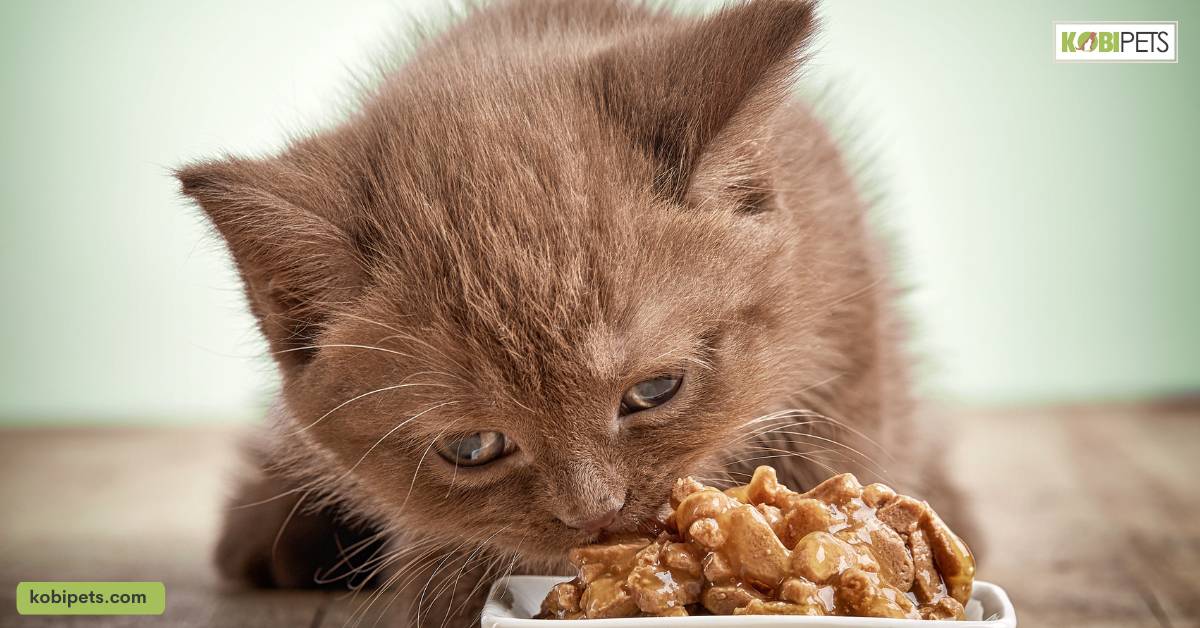
What to Do if Your Cat Eats Dog Food
If your cat has eaten dog food, there are several steps you can take to minimize any potential health risks:
- Monitor your cat: Keep an eye on your cat for any signs of digestive upset, such as vomiting or diarrhea. If your cat shows any symptoms, it’s best to contact your veterinarian for advice.
- Provide fresh water: Give your cat plenty of fresh water to help flush out any toxins or harmful substances from their system.
- Check the ingredients: Look at the ingredients list on the dog food to see if there are any potential allergens or harmful substances that could affect your cat’s health.
- Feed your cat a balanced diet: Make sure your cat is getting a balanced and complete diet that meets its nutritional needs. If you’re not sure what to feed your cat, talk to your veterinarian for advice.
- Keep dog food away from your cat: To prevent your cat from eating dog food in the future, make sure to keep dog food out of reach and separate from your cat’s food.
- Consult with your veterinarian: If you have any concerns about your cat’s health or diet, it’s always a good idea to consult with your veterinarian. They can provide specific advice and recommendations for your cat’s individual needs.
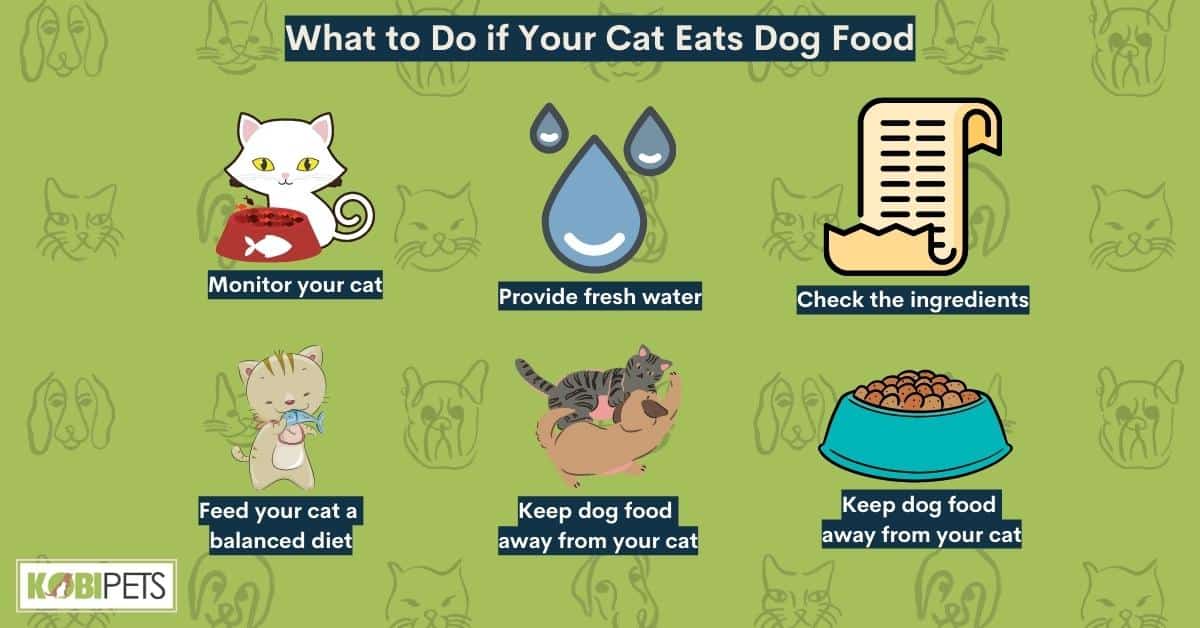
What to Do if Your Cat Eats Dog Food
In conclusion
In conclusion, cats can technically eat dog food but it isn’t recommended due to the major nutritional and dietary differences. Cats have specific needs that are different from dogs in terms of the nutrients they require, so a commercial food formula designed for cats provides them with what they need in order to stay healthy.






